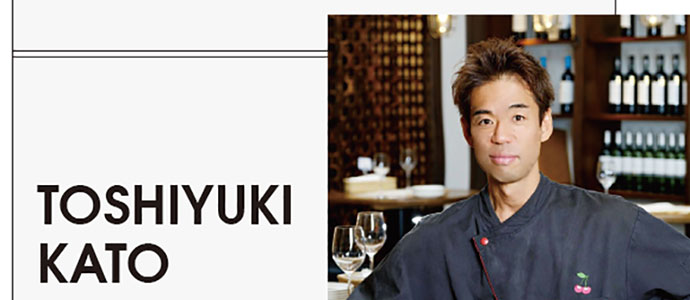Decoding Japanese Food Trends from Trade Shows - Series 3 part 2
Interview with Toshiyuki Kato, Executive Chef of Longing House -Review Committee Chair of “Natural Food: Audition to Discover New Recipes”-
Q: What is your retrospective view of this event, "Natural Food: Audition to Discover New Recipes"?
I think the event itself is outstanding. There hasn’t been anything like this before. The program was also well run and moderated, and very polished as an event.
Q: You've been the chef in a threestar restaurant in France, as well as spending time in America. How did you get into the vegan world?
After returning from France, I worked as head chef in restaurants in various places, and as I pursued cuisine, my interest in fresh and healthy vegetable cuisine kept growing. I came around to thinking that rather than focusing on main dishes of meat and fish as a cook, maybe I, as a lover of vegetables, should pursue vegetable cooking. At that time, a French man and a German woman visited the restaurant. They were a vegetarian couple. I heard that there was nothing on the menu that they could eat, so I made them some excellent vegetable dishes based on my own studies. They were delighted. After that, I learned more about the ideas that are important to vegetarians, and their love of the environment, health, and animals, and I could empathize, so I decided to use my own body experimentally in my culinary research.
Q: So veganism is your independent study?
For example, there are TV programs about the basics of French cuisine and Japanese cuisine, but there are no vegan programs. There are no well-established textbooks about vegan dishes, but many people are suffering because they have allergies or they can find nowhere to eat. The only way forward is to think my way out of this puzzle, starting without even the basics of veganism. I make vegan the standard and also work with halal and gluten-free foods. There’s probably nobody else who has moved from French to vegan cuisine, because vegans discard sauces, eggs, and dairy products. Try to imagine that. To use a shogi (Japanese chess) analogy, it’s like trying to win without any rook pieces.
Q: What is your dream for the future?
I want to establish one day a week as “vegetarian day” for the Japanese people. Wouldn’t making one day a week vegetarian day for everyone around the world be a good starting point for tackling all kinds of problems, including health and the environment? From April next year, I will be teaching French cooking at Yamanote Cooking & Confectionery College in Tokyo, and at the same time, I want to give the message of using organic and healthy ingredients, and not using dubious ingredients.
Q: This event will continue next year. Do you have any thoughts about it?
The finalists and everyone else have been studying well. But I got the impression that natural food is a field that everybody studies on their own, so it is very inconsistent. It's scattered, with no solid form like French or Italian cuisine. Natural food doesn't have a culture as a cuisine. It's inconsistent, with no backbone. I think the biggest result from this event is that it showed how incoherent the world of natural food is. That's a great thing, in a way. We only produce the flavors that we learn by following the examples of others, so it will be important to raise the basic level. So I rate this as a very valuable event, in the sense that it is a first step towards that end. I think we need to establish natural food as a genre in future like Chinese, French, or Italian. It is a great thing to have learned that through the audition.

